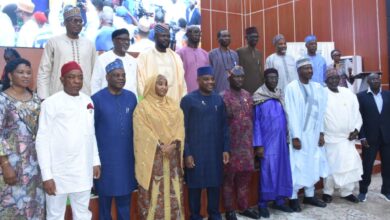We’ve Eliminated Use Of Vendors, Contracts, Says TETFund Boss

By Alice Etuka, Abuja
Executive Secretary of the Tertiary Education Trust Fund (TETFund), Arc Sonny Echono has said part of the reforms carried out by the agency was to eliminate the use of vendors and contracts in its academic and professional staff training interventions.
Echono stated this during an interview with newsmen on the sidelines of the 2nd Registrars’ Workshop and 75th Business Meeting of the Association of Registrars of Nigerian Universities, ARNU, in Abuja.
He said contracts were no longer used for its content-based interventions except in infrastructural projects where the procurement of goods, tools, laboratory equipment and others were needed.
Echono’s reactions came on the heels of allegations by an online publication that TETFund awarded N7.6 billion questionable contracts within two months, saying the fund acted outside its mandate in carrying out capacity building programmes in its beneficiary institutions.
But the TETFund boss explained that the fund had been leveraging on Memoranda of Understanding (MoUs) to carry out its academic and professional staff training since 2016:
“We do not use contracts, we have eliminated the use of vendors; we do serious academic and professional training.
“We sponsor people for postdoc, for bench work, or even academic degrees: masters and PhDs, and for professionals proficiencies and certification in ICT that will improve employability.
“So when detractors try to say things like these, they’re calling it contracts, because they are trying to criminalise when they knew for example, that contracts you cannot pay more than 30% as advanced payments”, he said.
The TETFund Helmsman disclosed that in one of the MoUs reached recently with CAMPUS France (which controls about 29 universities), the cost of tuition for Nigerian scholars was slashed by 20 per cent.
He said before now Nigerian institutions that were patronising other institutions were paying regular fees, but now it had been reduced by 20 percent, adding that these MoUs were saving billions for Nigeria.
Echono added that in the case of Federation of African Research Association (FARA) in Brazil, Nigeria had 100 scholars and that the MoU was initially only on agriculture; but he inherited and expanded it, and there are now 48 institutions involved instead of the initial 18 and all the scholars from Nigeria were now getting free tuition.
He said the Fund had received over 800 applications for the 150 spaces provided for Nigeria because it is cheaper to train with that.
“We through this process of negotiation also in compliance with our own laws, are the ones that said please we can only give you 85% because there is a requirement for us to show evidence of performance of monitoring before we release the final 15%, which is what we were able to negotiate.
“We have removed all these middlemen; people are not happy but I am sorry, that is the job I was asked to come and do; we have removed the willing and dealing and have been able to restore the image of our institutions, and we are proud of that achievement,” he said.
On the procurement of blackboards, he said the Fund had MoU with an American company which made the purchase of the boards cheaper, adding that individual institutions keyed into the project and paid for the boards to eliminate cost.
“Rather than dealing with vendors who do not have capacity because these issues are intellectual property rights; they are also issues related to tuition. So we don’t discuss contract when we’re talking about academic training and professional training.
“What is applicable are the fees, the tuition fees that people pay per student; and when you add all the costs for all these schools, you now get 7.6 billion. It sounds alarming, but the reality is that the vote for this for each school, each polytechnic and college of education is 25 million.
“The highest is for the university that is 50 million and we are able able to make over 60% savings on this because we went straight to the owners of the copyright.
“We went straight rather than using their agents because the agents can only give you discounts on the commission they get from the owners of the copyright, but given the type of volume that we’re bringing, we gave all the leverage to be able to negotiate.
“And these are done by experts on our behalf who have track record and all the schools were in agreement,” he said.
Echono further explained that, “There is a fundamental difference between the various types of interventions where we prefer to do infrastructure projects, where we are procuring goods or equipment, tools, laboratory equipment, or whatever when we are procuring consultancy services, we use the contract system because that is the most suitable way of getting those services.
“But for the content component of our interventions, and that includes the research, and our academic and professional staff training, we do not use contracts; we have eliminated the use of vendors.
“These are the opportunities we are offering to our students and our academicians. For these, we have always adopted memoranda of agreement, MOUs and the difference is very clear, contracts are always geared towards profit. Everybody knows that the contract system was part of the image problems I was forced to clear as part of my reforms in TETFund.”






